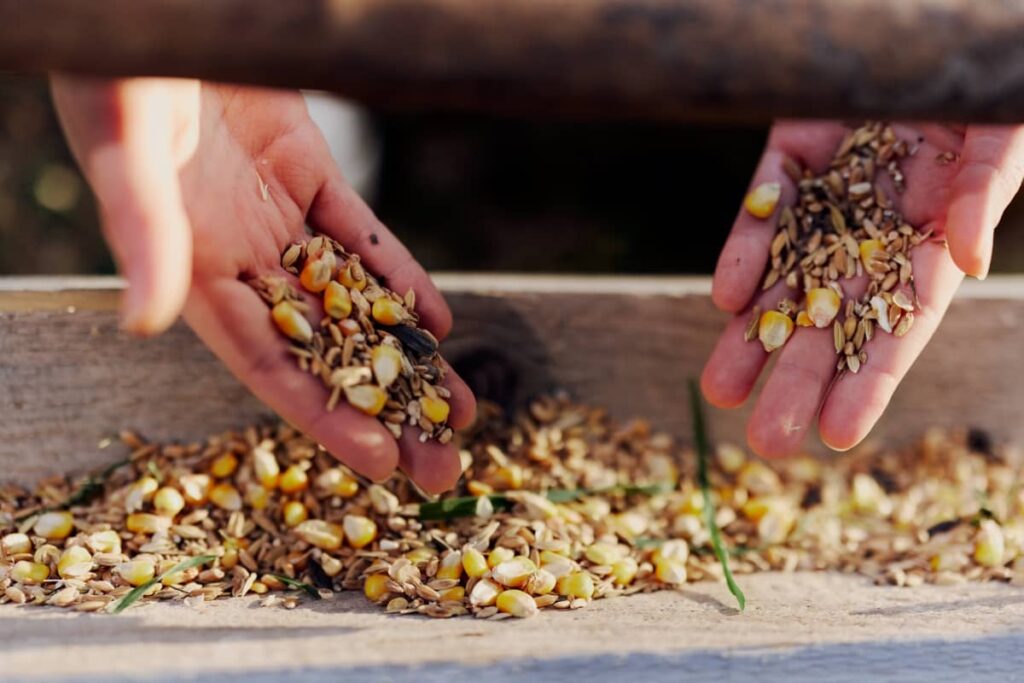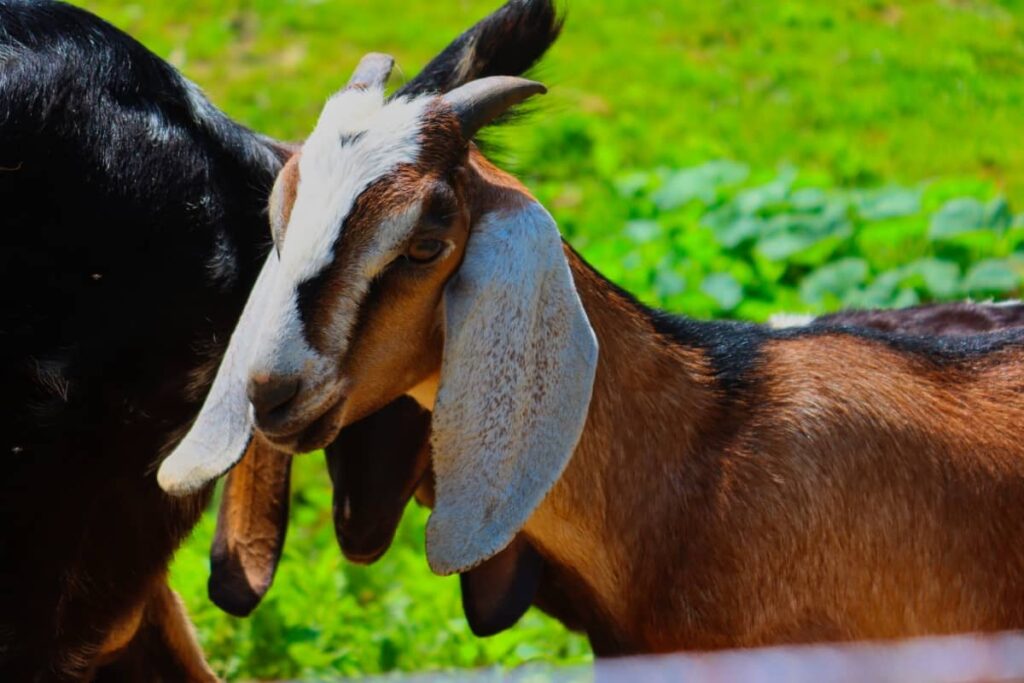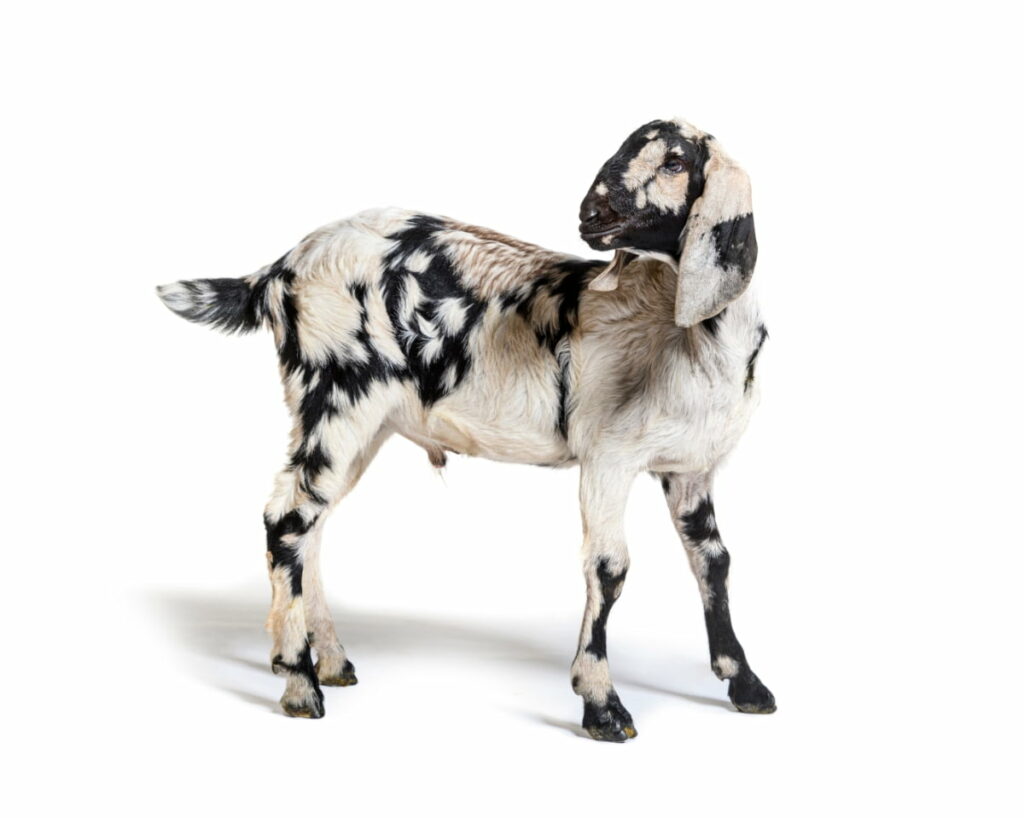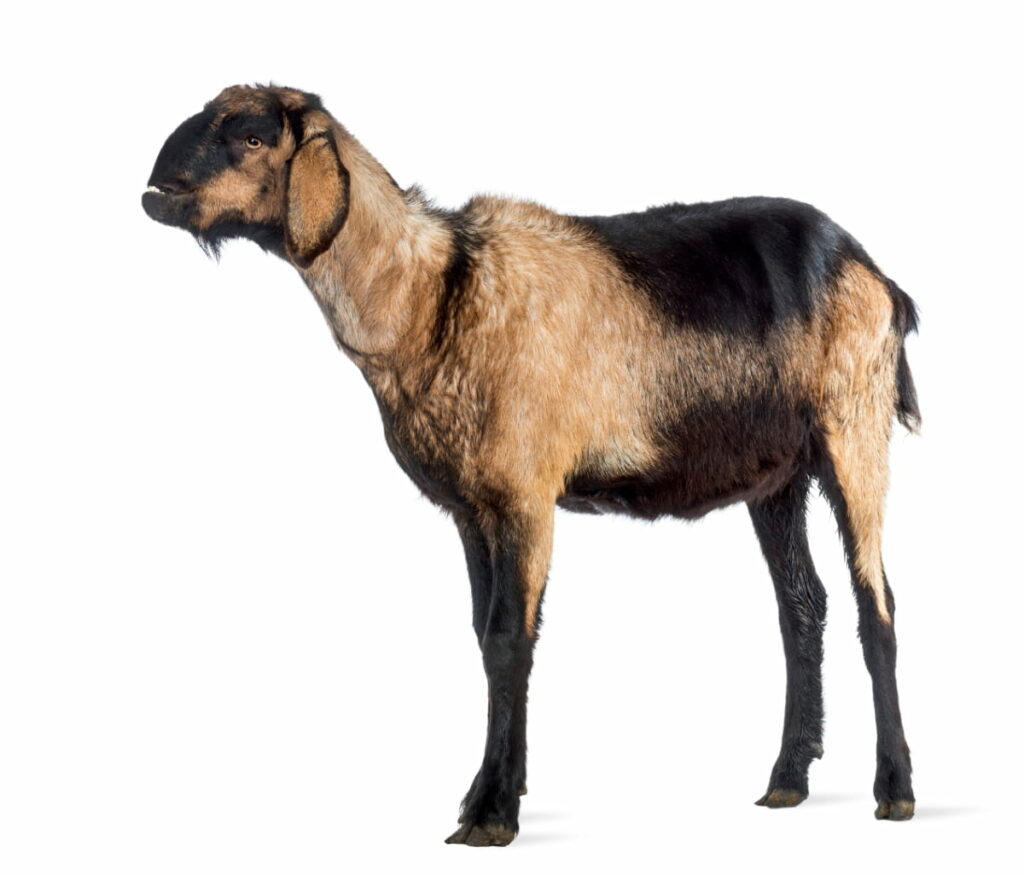Nubian, a breed of goat, probably native to Africa but common also in India and the Middle East since ancient times. Nubian goats may also be called Anglo-Nubian goats. Nubian goat feed management encompasses the practices and strategies involved in providing a balanced and nutritious diet for Nubian goats.

Nubian Goat Feed Management
Basics and Importance of Nubian Goat Diets
Nubian goats are a popular goat breed known for their high milk production and gentle temperament. To ensure that these beautiful animals thrive, it is crucial to understand the basics of Nubian goat nutrition and the importance of maintaining a healthy diet. A balanced diet is important in the overall health and productivity of Nubian goats. Maintaining proper nutritional balance is crucial for keeping your Nubian goats healthy and thriving.
Understanding Feed Types
Roughage: Hay and Pasture
Roughage plays a vital role in your goat’s diet. It consists of sources like hay and pasture. Hay provides essential fiber to goats that aid in digestion and keep their rumen healthy. Choose from high-quality grass or legume hay such as timothy or alfalfa. Pasture grazing allows goats to forage on fresh vegetation while providing exercise.
Concentrates: Grains and Pellets
Concentrates are another important component of a well-balanced diet for Nubian goats. Grains like corn, oats, barley, and wheat provide energy-rich carbohydrates necessary for growth and milk production. Pellets formulated specifically for goats can also be used as concentrates to ensure they receive adequate nutrition.
Supplements: Minerals and Vitamins
Supplements come in handy when certain nutrients are lacking in their primary feeds. Minerals such as calcium and phosphorus help maintain strong bones, while vitamins like A, D, and E support overall health and immunity.
Nutritional Requirements
Nutrient Needs: Protein, Energy, and Fiber
Protein is an essential component of a Nubian goat’s diet as it supports muscle growth, repair, and milk production. High-quality protein sources, such as legumes and forage crops like alfalfa or clover hay, can provide the necessary amino acids required by these goats.
Energy is another vital aspect that should not be overlooked when considering Nubian goat feed management. Energy-rich feeds like grains (such as corn or barley) can help meet their energy requirements. Fiber plays a significant role in maintaining proper digestion and preventing gastrointestinal issues in Nubian goats.
Minerals and Vitamins: Essential for Health
Vitamins are essential for the overall health of Nubian goats. Minerals like calcium, phosphorus, selenium, copper, and zinc are needed in appropriate amounts to support bone development and immune function.
Water: Ensuring Adequate Intake
Water intake is often underestimated but equally important when managing Nubian goat feed properly. Access to clean, fresh water at all times ensures proper hydration, which aids digestion and prevents dehydration-related health problems.
In case you missed it: Pygmy Goat Feed Management: A Comprehensive Guide for Beginners

Feeding Practices by Life Stage
Kids: Nutrition from Birth to Weaning
From birth to weaning, kids require a well-balanced diet that promotes healthy growth and development. This includes providing them with high-quality milk or milk replacer, as well as introducing solid feeds gradually.
Growing Goats: Post-weaning to Adulthood
Once the kids have been weaned, they enter the growing stage, where their nutrient requirements change. During this time, it’s crucial to provide them with a diet rich in protein and energy to support muscle and bone development. Feeds such as hay, grains, and pellets can be introduced alongside fresh water.
Adults: Maintenance and Breeding
As Nubian goats reach adulthood, their dietary needs shift towards maintenance and breeding. At this stage, a diet consisting of quality forage like pasture or hay is essential for maintaining overall health.
Lactating Does: Meeting High Energy Needs
Lactating does have increased energy demands due to milk production. To meet these high-energy needs, it’s important to offer them a balanced diet that includes concentrates like grains or pellets along with ample roughage sources such as pasture or hay. Remember that each goat is unique and may require individualized feeding strategies based on factors like body condition score and health status.
Pasture Management
Benefits of Pasture for Nubian Goats
Allowing your animals access to high-quality pasture can have several benefits for their overall health. Grazing on fresh grass and plants provides essential nutrients that are easily digestible for goats. In addition to the nutritional benefits, pasture also offers exercise opportunities for your goats.
Rotational Grazing: Maximizing Pasture Use
To maximize the use of your pasture, consider implementing rotational grazing practices. This involves dividing your land into smaller paddocks and systematically rotating the goats through each area. Proper maintenance of your pastures is key to ensuring year-round grazing availability.
Supplemental Feeding Strategies
When and How to Supplement
Supplemental feeding plays a crucial role in maintaining the optimal health and productivity of Nubian goats. When it comes to deciding whether to provide supplements, factors such as the quality of available forage, stage of life, production goals, and overall herd health must be considered.
Selecting the Right Supplements
Selecting the right supplements is equally important. High-quality protein sources like soybean meal or alfalfa pellets can help meet their protein needs. Additionally, minerals such as calcium, phosphorus, magnesium, and copper should be included in appropriate ratios.
Monitoring for Over- or Under-Supplementation
Monitoring for over- or under-supplementation is vital to maintain a balanced diet. Over-supplementation can lead to mineral imbalances or toxicity issues, while under-supplementation may result in nutrient deficiencies that negatively impact growth and reproduction.
Feed Storage and Safety
Proper Storage Techniques for Feed
Proper storage techniques ensure that the feed remains fresh and high in nutritional value. One important practice is to store the feed in a cool place away from direct sunlight. This helps prevent moisture, which can lead to mold growth and spoilage.
Preventing Contamination and Spoilage
Contamination and spoilage can occur if feed comes into contact with rodents or insects. It’s essential to use sealed containers or bins that are rodent-proof to keep pests out of the feed. Regular cleaning of the storage area is also necessary to prevent any accumulation of droppings or debris. Safe handling practices should be followed when handling feed for Nubian goats.
In case you missed it: Boer Goat Feed Management: Understanding Feeding Requirements, Program, Schedule, and Rations

Health and Nutrition
Recognizing Nutritional Deficiencies
Recognizing nutritional deficiencies is essential to ensure the overall well-being of your goats. Keep an eye out for signs such as poor growth, dull coat, or decreased milk production, as these may indicate a lack of specific nutrients in their diet.
Dealing with Feeding-Related Health Issues
Dealing with feeding-related health issues requires a proactive approach. For example, if you notice symptoms like bloating or diarrhea, it could be due to overfeeding or feeding low-quality hay. Adjusting the feed portions and offering high-quality forage can help alleviate these issues.
Preventative Nutrition Strategies
Preventative nutrition strategies play a vital role in maintaining optimal goat health. One way to achieve this is by providing balanced diets for each life stage. Regularly monitoring body condition scores can also aid in identifying potential issues early on.
Feeding Equipment and Facilities
Types of Feeders and Waterers
Providing appropriate feeders and waterers ensures that your Nubian goats have access to food and water cleanly and efficiently. There are various types available, including troughs, hay racks, automatic waterers, and buckets. Each option has its advantages, so choose what works best for your setup.
Designing Goat-Friendly Feeding Areas
Creating a goat-friendly feeding area involves careful planning to promote ease of access for the animals while preventing waste or contamination. Consider factors such as space allocation, layout design, flooring materials (to prevent slipping), and shelter options (to protect feed from weather conditions). Keeping the feeding areas clean is crucial for maintaining good herd health.
Economic Aspects of Feeding Nubian Goats
Budgeting for Feed Costs
Budgeting for feed costs involves understanding the nutritional requirements of Nubian goats. This will help you estimate how much feed they need and allocate funds accordingly. It’s important to consider factors such as age, weight, activity level, and reproductive status when determining their nutritional needs.
Evaluating Feed Cost vs. Nutritional Value
Evaluating feed cost versus nutritional value is another vital aspect of managing the economic aspects of feeding your Nubian goats. While it may be tempting to opt for cheaper feeds, it’s crucial to assess their nutrient content accurately. Cheaper feeds may lack essential nutrients or have lower digestibility rates, leading to poor overall health outcomes and increased veterinary expenses down the line.
Strategies for Reducing Feeding Expenses
To reduce feeding expenses without compromising on nutrition, consider implementing some strategies. One approach is purchasing high-quality feeds in bulk or from local suppliers who offer competitive prices. Additionally, exploring alternative sources of feed like crop residues or pasture grazing can help decrease reliance on commercial feeds.
In case you missed it: Asmari Goat: Breed Characteristics, Origin, Size, Lifespan, Price, and Raising

Conclusion
Proper feed management begins with understanding the nutritional requirements of Nubian goats at different stages of life. From kids to lactating does, each stage demands specific nutrients such as protein, energy, fiber, minerals, and vitamins. Achieving a balance between these components is crucial for maintaining the overall well-being of the animals.
- Types of Grass Growing for Goat Farm
- How to Train Goats for Milking: A Beginners Guide
- Goat Milking Practices and Equipment: A Beginner’s Guide
- Goat Farming for Fiber: Producing Mohair and Cashmere
- Maximizing Goat Milk Production: Tips for Dairy Goat Farmers
- Goat Farming as a Family Business: Strategies for Success
- Profitable Kenya Goat Breeds for Commercial Dairy and Meat Business
- Unlock the Secrets of Oberhasli Goat: Discover Raising and Management Practices
- Ultimate Guide to Myotonic Goats: Explore Profile to Raising